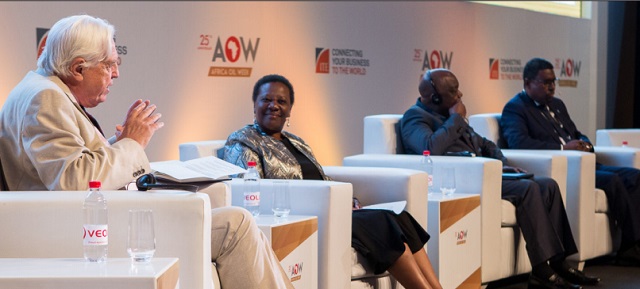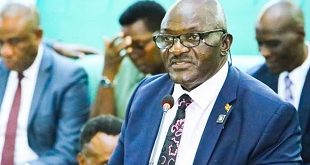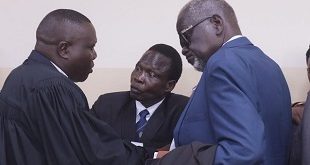
Uganda woos new oil investors in Cape Town
Kampala, Uganda | RONALD MUSOKE | Despite the current stalemate in the local oil and gas industry, the government remains optimistic that the joint venture oil companies involved in commercializing Uganda’s petroleum resources will reach a final investment decision before April, 2020.
Eng. Irene Muloni who in early November led Ugandan delegates to the Africa Oil Week in Cape Town, South Africa, told the over 1,500 delegates that; Tullow Oil, Total E&P Uganda and China National Offshore Oil Corporation (CNOOC) are “striving to fast track the processes to first oil.”
“The Government has intervened to resolve the standoff, in order to fast track the achievement of the Final Investment Decision by the end of the first quarter of 2020,” she said.
On Aug.29, Ugandans woke up to news that Tullow Oil Plc’s farm-down to its joint venture partners; Total E&P Uganda and CNOOC had been terminated. Total immediately announced that it was suspending activities on the East African Crude Oil Pipeline (EACOP), one of the flagship projects that have been scheduled to commercialize Uganda’s petroleum resources.
Observers of the sector said at the time that Total’s move was an indicator that all was not well in the sector and that this development would force the government to “sober-up.”
Muloni told delegates attending the continent’s premier hydrocarbons conference that the government alongside the joint venture partners is “working to ensure that the development and production stage is expedited.”
She said key milestones on the road to Uganda’s first oil have already been achieved. These include; the establishment of institutions, legislation and the conclusion of key Front End and Engineering Designs (FEED) and the Environment and Social Assessment (ESIA studies).
Looking for more oil
Uganda has made 21 discoveries so far, with 88% drilling rate, and 6.5bn barrels of oil are in place of which 1.4bn barrels are recoverable. Nine production licenses have been issued to Total E&P, CNOOC Uganda Limited and Tullow Uganda. Three exploration licenses have also been issued to Nigerian firm, Oranto Petroleum Limited, and Australia-based Armour Energy.
Speaking on the sidelines of the conference, the energy minister also took time to promote the country’s second licensing round that was launched in May at the East African Petroleum Conference and Exhibition held in Mombasa, Kenya.
Muloni explained that Uganda is looking to increase the country’s petroleum resources with, 90% of the Albertine basin currently unlicensed. Preliminary exploration work in other basins is also ongoing, and an oil seep has been encountered by the energy ministry’s technical teams in the northeastern Kadam basin, providing evidence of a working petroleum system.
She invited companies to bid for the five highly prospective blocks; Avivi, Omuka, Kasurubani, Turaco and Ngaji in the ongoing second licensing round. She said the deadline for responding to the request for qualification for the second licensing round is Dec. 31, this year.
“The entire Albertine basin is de-risked, some of these five blocks neighbour the other development projects (Tilenga and Kingfisher), and the support infrastructure, making them highly lucrative” she said.
Uganda’s strategy, Muloni said, seeks to optimize the investment benefits from the petroleum sector in order to develop durable sustainable infrastructure and technology that will facilitate investments in renewable sources of energy.
Uganda was commended for laying a robust legal and institutional framework to manage the sector before oil production begins.
Nosizwe Macamo, the chairperson Friburge oil and gas, an indigenous company from Angola commended Uganda for implementing a strategy that focused on building capacity in government and legislative reforms, prior to oil production.
“Uganda’s strategy to first develop local technical capacity in the sector has paid off,” he said, “Other oil producing countries, especially in Africa are doing this, after they have produced for decades, and have suffered the consequences of weak legal frameworks among other pitfalls.”
“We can learn a lot from Uganda,” Macamo added.
The Africa Oil Week, now in its 26th year, is an annual continental event that brings together a wide network of global oil and gas operators, contractors and governments across Africa. This year, 25 African ministers of energy were among the over 1500 delegates who attended the conference.
****
 The Independent Uganda: You get the Truth we Pay the Price
The Independent Uganda: You get the Truth we Pay the Price


